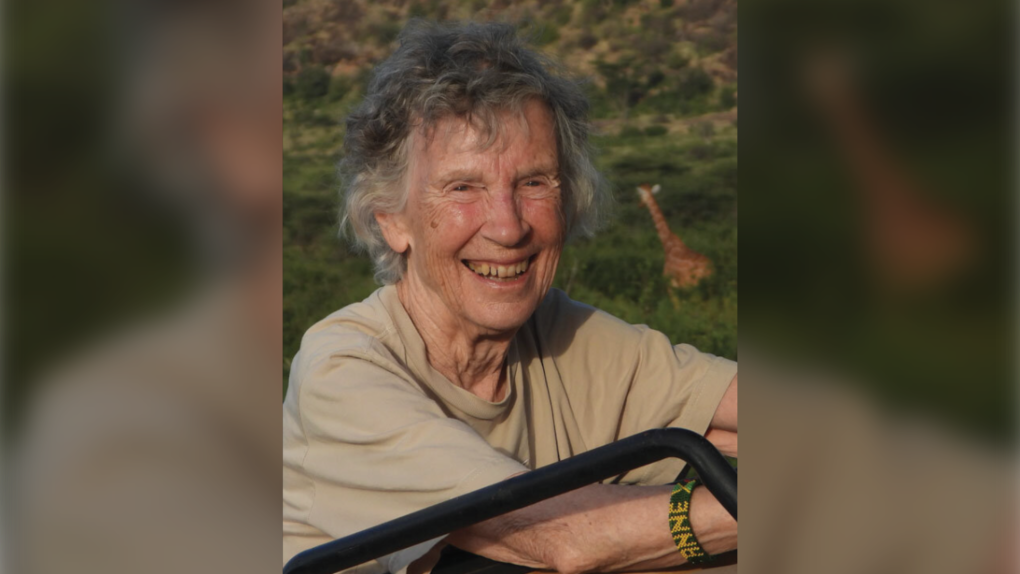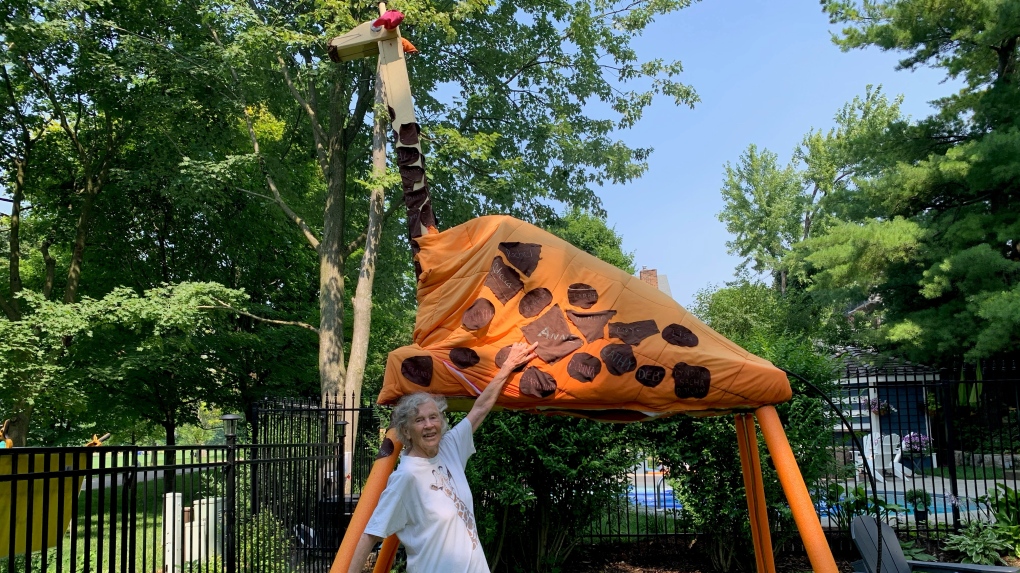Ground-breaking Canadian giraffe researcher Anne Innis Dagg dies at 91
Ground-breaking Canadian giraffe researcher and feminist activist Anne Innis Dagg has died at the age of 91.
"[She was] someone who had unbelievable perseverance in everything she did,” said Marry Dagg, one of Anne's three children and CEO of the Anne Innis Dagg Foundation. “She would always say ‘This is wrong, I need to make it right, and I'm going to keep going until it is.’ And really wouldn't let anything stop in her way."
In 1956, at Innis Dagg travelled to South Africa at just 23 years old, becoming the first western scientist to study giraffes in the wild.
At the time, women were not expected to do field biology. In fact, Innis Dagg hid the fact she was female while making arrangements for the trip.
"This is a person who got on a boat when she was in her early twenties to go all the way to South Africa, all by herself to sit in a field with a notepad and just record what she saw giraffes doing in the wild," said Dan Riskin, CTV Science and Technology specialist. "You have to be a special kind of person to have that kind of guts."
Innis Dagg went on to get her PhD in Animal Behaviour at the University of Waterloo in 1967.
Described by some as the Jane Goodall of giraffes, she wrote 60 scientific papers and 26 books on the species in her lifetime. Her 1976 book “Giraffe: Biology, Behaviour and Conservation” is considered the definitive text on the animal.
"That's still used by giraffe biologists today as kind of the Bible of giraffes," said Matthew Smith, a professor and chair of biology at Wilfrid Laurier University.
 Anne Innis Dagg wrote 60 scientific papers and 26 books on giraffes during her lifetime, including “Giraffe: Biology, Behaviour and Conservation,” considered the definitive text on the animal. (Anne Innis Dagg Foundation)
Anne Innis Dagg wrote 60 scientific papers and 26 books on giraffes during her lifetime, including “Giraffe: Biology, Behaviour and Conservation,” considered the definitive text on the animal. (Anne Innis Dagg Foundation)
Still, she faced numerous barriers as a female scientist, leading her to become an advocate for gender equality, particularly in academia.
She began teaching at the University of Guelph in 1968, but four years later she was denied tenure. In an interview with CTV’s W5 in 2021, Innis Dagg maintained that decision was due only to her gender.
Innis Dagg says she was also told by a University of Waterloo Dean that he would never give tenure to a married woman, and when she applied to Wilfrid Laurier University positions she was never granted an interview.
"So she turned a lot of her efforts so say 'I'm going to make a difference for women,'" her daughter Mary Dagg explained.
Innis Dagg never became a full professor, but in 1986 she was hired by the students of the Integrated Studies program at the University of Waterloo, where she worked to fight discrimination against women in academia.
Recognition came only in the later years of her life after the release of the 2018 documentary The woman who loves giraffes.
The University of Guelph offered a formal public apology to Innis Dagg for her treatment by the institution and created a summer research scholarship in her name for a female student.
Wilfrid Laurier University also holds an annual Anne Innis Dagg lecture, featuring notable Canadian women studying animal biology. The last one was held just a few weeks ago on March 7, with Innis Dagg in attendance.
“It was almost like there was a rock star in attendance, all the students wanted to meet her, [she was] happy to meet them as well,” Smith said.
 Anne Innis Dagg stands in front of Spot the Giraffe in Waterloo, meant to highlight her many years of work studying and educating people about the animal. (Jessica Smith/CTV Kitchener) (July 25, 2021)
Anne Innis Dagg stands in front of Spot the Giraffe in Waterloo, meant to highlight her many years of work studying and educating people about the animal. (Jessica Smith/CTV Kitchener) (July 25, 2021)
Innis Dagg also received numerous honourary doctorates during her lifetime, and the Order of Canada in 2020.
That same year, Innis Dagg established the Anne Innis Dagg Foundation, focused on raising awareness and funding for conservation in Africa to help giraffes survive and thrive in the wild.
Even in her final days, she was committed to educating the next generation. Just days before she passed away, she attended a screening of her documentary for a wildlife club.
"Her message was always about the youth, it was always about conservation, education. If you know about something you can care about it," Mary Dagg said.
Innis Dagg died in Kitchener on April 1, 2024.
Upcoming exhibit at THEMUSEUM
A new exhibit will be opening at THEMUSEUM this June based on Dagg’s work. Called “GIRAFFE | A Heightened Experience,” it will include artifacts and original videos from her life and studies in South Africa. THEMUSEUM said there will also be immersive displays, wildlife photography by Ana Carolina Esteves Dias and virtual reality experiences.
“Our team has been privileged during the last year to have worked with Dr. Dagg, her daughter Mary, Paul and Lesley Zimic and the Anne Innis Dagg Foundation to create an exhibition on her extraordinary scientific studies,” THEMUSEUM wrote in a media release Thursday. “In getting to meet Anne, we quickly learned that even in her 90s she was a smart, funny, and as evidenced by her trailblazing contributions, an important woman in the field of science.”
The exhibit opens on June 8 and, once it wraps up, will go on to tour across Canada.
More to come.
CTVNews.ca Top Stories

Trudeau's 2024: Did the PM become less popular this year?
Justin Trudeau’s numbers have been relatively steady this calendar year, but they've also been at their worst, according to tracking data from CTV News pollster Nik Nanos.
Manhunt underway after woman, 23, allegedly kidnapped, found alive in river
A woman in her 20s who was possibly abducted by her ex is in hospital after the car she was in plunged into the Richelieu River.
Toronto firefighters rescue man who fell into sinkhole in Yorkville
A man who fell into a sinkhole in Yorkville on a snowy Friday night in Toronto has been rescued after being stuck in the ground for roughly half an hour.
Wild boar hybrid identified near Fort Macleod, Alta.
Acting on information, an investigation by the Municipal District of Willow Creek's Agricultural Services Board (ASB) found a small population of wild boar hybrids being farmed near Fort Macleod.
Summer McIntosh makes guest appearance in 'The Nutcracker'
Summer McIntosh made a splash during her guest appearance in The National Ballet of Canada’s production of 'The Nutcracker.'
Death toll in attack on Christmas market in Germany rises to 5 and more than 200 injured
Germans on Saturday mourned both the victims and their shaken sense of security after a Saudi doctor intentionally drove into a Christmas market teeming with holiday shoppers, killing at least five people, including a small child, and wounding at least 200 others.
Overheated immigration system needed 'discipline' infusion: minister
An 'overheated' immigration system that admitted record numbers of newcomers to the country has harmed Canada's decades-old consensus on the benefits of immigration, Immigration Minister Marc Miller said, as he reflected on the changes in his department in a year-end interview.
22 people die in a crash between a passenger bus and a truck in Brazil
A crash between a passenger bus and a truck early Saturday killed 22 people on a highway in Minas Gerais, a state in southeastern Brazil, officials said.
Back on air: John Vennavally-Rao on reclaiming his career while living with cancer
'In February, there was a time when I thought my career as a TV reporter was over,' CTV News reporter and anchor John Vennavally-Rao writes.
































